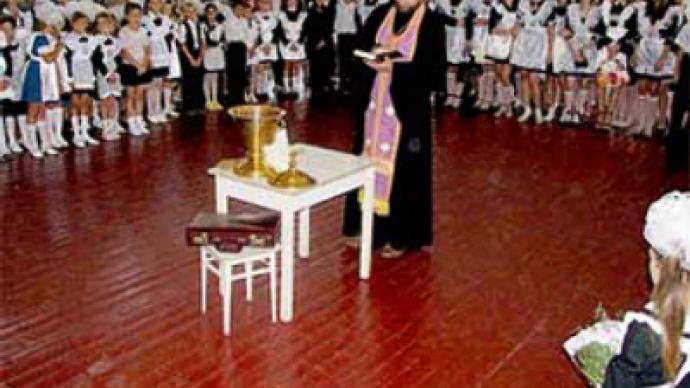School forces child to attend religious rite

A 6-year-old boy has reportedly been forced to take part in a religious ceremony at a public school.
Now his parents want to appeal to the European Court on Human Rights after a court in Russia denied their claim that the child’s rights were violated.
On Thursday a court in Voronezh denied an appeal to overturn a previous court ruling. The request was made by the parents of David Perov.
Consecrated classroom
According to David’s parents, on September 3 last year, when they came to take their son from school at the end of the day, they could not immediately find him. They eventually found him hiding under the stairs, where the boy said that before the day’s lessons began a religious Orthodox ceremony was held in class when an Orthodox priest came into the classroom to consecrate it.
According to the boy, children were told to make the sign of the cross, say prayers and kiss the cross. David told his parents he didn’t want to ‘kiss the thing since he didn’t know what it was’, causing his classmates beat him after the lesson. However, there were no bruises or marks on the child’s body.
Also, the regional Prosecutor’s Office did not find proof that David had been the victim of violence. But it acknowledged that the child’s freedom of conscience was violated, as well as the principle of secular education in the country as stated by Russian law.
However, the district court rejected the claim and the Perov’s demand that the school pay them monetary compensations for the moral damage. The parents had asked for a sum of 247 thousand rubles (about 6900 US dollars). The court added that it found that no human rights violations had occurred. After that ruling, the parents appealed to a higher court, seeking a reversal of the lower court.
‘Wrong’ creed?
The Perov family is not Orthodox, as they belong to a Mormon church. They claim that their child’s teacher knew this about their religious views but never told them that the traditional Orthodox ceremony was going to be held in the classroom. However, it is reported that the teacher received permission from all Orthodox parents to have the classroom consecrated.
The Perovs say their claims are based upon Russian laws that say minors cannot receive religious education against their will and without parents’ permission.
They also based their grievance on Protocol n°1 of the European Convention which says the state must respect a parents’ right to provide their children with an education corresponding to their religious and philosophical views.
‘Orthodox priest protected!’
According to information from the Interregional Human Rights group, published on their site, an Orthodox priest, Aleksandr Muravyov, delivered his objections to the regional court concerning the case. It was Muravyov who held the ceremony in class. He claimed that “the school administration has no right to ban parents and their children from praying in the school building”.
And at the site Religare.ru the story is told from a very different angle. “Orthodox priest protected from Mormon family attacks”, their headline reads.
Society divided over religious education
Russian society is still divided over whether religious studies should be introduced as a required course in schools. After the collapse of the Soviet Union, religion was introduced in many Russian schools.
Official statistics show 85 per cent of Russians are Christian Orthodox, though there remains fears that such religious education violates constitutional rights.
Still, these concerns are not only about Orthodoxy, but religious education in general. Officially, Russia is a secular state.
Several Russian scientists wrote a letter to the Russian President where they shared their concerns about the growing role of the church in education. Meanwhile, Russia’s clergy says the absence of religious education leads to the spread of immorality.














